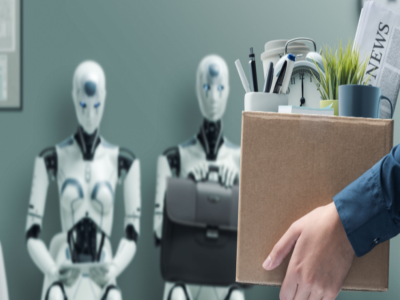
What Jobs Are in Danger from AI
Artificial intelligence (AI) is changing the work economy, and its effects are becoming more noticeable as it develops quickly. AI presents a danger to a number of vocations that might become obsolete or undergo a major transformation, even while it also has the ability to open up new possibilities and sectors. This blog examines the kinds of employment most vulnerable to automation and artificial intelligence, as well as the implications for the nature of work in the future.
1. Regular and Repeated Tasks
Regular and repetitive operations are among the jobs that are most susceptible to AI automation. These jobs are perfect candidates for robotic automation and artificial intelligence (AI) as they frequently involve little to no task variation.
For instance, robots and automated systems are gradually replacing people in industrial jobs like assembly line operators and quality control inspectors. Similarly, as AI systems get better at managing repetitive activities like organizing meetings or entering data, human workers who execute similar duties like data entry clerks or administrative assistants risk losing their jobs.
2. Agents of Customer Service
AI is potentially a danger to customer service jobs, especially those involving simple questions and assistance. Virtual assistants and chatbots are getting better at comprehending and answering to consumer inquiries. They may handle anything from basic troubleshooting to order processing.
AI-driven customer support systems are able to work around the clock and provide clients with timely, reliable replies. Large customer care staff may become unnecessary as more basic support activities are handled by AI, even while complicated or nuanced relationships with clients may still require a human touch.
3. Clerks in retail and checkout
Automation and artificial intelligence are causing a huge upheaval in the retail industry. Retail operations are changing as a result of self-checkout kiosks, automated systems for managing inventory, and AI-driven tailored marketing.
Checkout clerks are not as necessary in supermarkets and other establishments because to self-service checkout systems. AI-powered inventory systems may also anticipate demand and manage stock levels more effectively than human workers, which has an influence on stocking and inventory management tasks.
4. Drivers for Delivery and Transport
One of the main factors endangering jobs in the logistics and shipping industries is the proliferation of autonomous cars. Drones, trucks, and self-driving vehicles are being created and tested to take over activities that human drivers have historically performed.
For example, businesses are presently developing autonomous trucks so that commodities may be transported over great distances without the need for human drivers. Similar to this, goods and groceries are being delivered by delivery drones and robots, which may eliminate the demand for delivery drivers or couriers.
5. Accountants and Financial Analysts
Many of the duties that financial analysts or accountants used to undertake are now being automated by AI in the financial sector. With little assistance from humans, AI systems can analyze enormous volumes of financial data, spot trends, and provide reports.
Tasks like spending monitoring, tax preparation, or investment research may be handled by automated accounting software or AI-driven financial projection tools. A growing number of mundane financial jobs are being handled by AI, even while sophisticated advising positions and strategic financial planning may still require human experience.
6. Assistance with Law and Paralaw
By automating processes linked to case management, document review, and legal research, AI is gaining traction in the legal industry. Artificial intelligence (AI) has the potential to eliminate the demand for paralegals or junior attorneys by analyzing vast amounts of legal papers, finding pertinent information, and helping with the writing of contracts.
For instance, AI systems can swiftly examine contracts to spot any problems or discrepancies; this is a process that would typically take a lot of time and legal professionals' skills. AI technology is expected to play a bigger part in legal support tasks as it develops.
7. Creative Domains: Illustration and Text Production
The effects of AI are being seen even in artistic fields. Artificial intelligence (AI) tools that produce art, write essays, or make music are getting increasingly advanced. AI systems have the ability to create material that imitates human creativity, upending established positions in industries like music composition, copywriting, and graphic design.
AI-generated content is rapidly being utilized to help with initial draft generation, layout design, and promotional material creation, even if it may not completely replace human creativity. The need for human designers as well as producers may change as a result of this change, necessitating their adaptation to new tools and techniques.
Conclusion
A wide number of occupations are being impacted by AI and automation, which is changing the labor market. As AI technologies advance, jobs in regular chores, customer service, retail, transport, banking, legal assistance, and even creative sectors might become vulnerable. Even if these changes come with difficulties, they also give employees the chance to grow and learn new skills. Finding new occupations that make use of the special skills of human intellect and navigating the future work market will require embracing flexibility and lifelong learning.